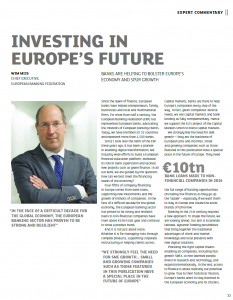1000 Companies to Inspire Europe
5 September 2017
 In an event at the European Parliament in Brussels the London Stock Exchange Group PLC on Tuesday presented the 2017 edition of its ‘1000 Companies to Inspire Europe’ report. The publication is LSE’s celebration of some of the fastest-growing and most dynamic small and medium-sized enterprises (SMEs) across Europe. As well as identifying 1000 companies, the annual reports examine in detail the opportunities and challenges facing SMEs and looks at the sectors and trends that will shape the future of the European economies.
In an event at the European Parliament in Brussels the London Stock Exchange Group PLC on Tuesday presented the 2017 edition of its ‘1000 Companies to Inspire Europe’ report. The publication is LSE’s celebration of some of the fastest-growing and most dynamic small and medium-sized enterprises (SMEs) across Europe. As well as identifying 1000 companies, the annual reports examine in detail the opportunities and challenges facing SMEs and looks at the sectors and trends that will shape the future of the European economies.
Click here for the full version of the #1000Companies report on the LSE website.
EBF CEO Wim Mijs contributed the following expert commentary to the report:
Investing in Europe’s Future
By Wim Mijs, Chief Executive Officer of the European Banking Federation
Since the dawn of finance, European banks have helped entrepreneurs, family businesses and local and multinational firms. For more than half a century, the European Banking Federation has represented European banks, advocating the interests of European banking clients. Today, we have members in 32 countries and represent over 4,500 banks.
Since I took over the helm of the EBF three years ago, the EBF has been a pioneer in enabling digital transformation, led industry-wide efforts to build a European financial education platform, bolstered its role in bank supervision and tackled new projects such as green finance. In all our work, we are guided by the question: How can we best meet the financing needs of the economy?
Four-fifths of company financing in Europe comes from bank loans, supporting new investments and the growth of millions of companies. In the face of a difficult decade for the global economy, the European banking sector has proven to be strong and resilient; loans to non-financial companies have risen above €10 trillion last year and continue to show a positive trend.
And it is not just about loans. Whether it is for managing risks through complex products, supporting corporate restructuring or helping clients access capital markets, banks are there to help Europe’s companies every step of the way. In fact, given companies’ diverse needs, we see capital markets and bank lending as fully complementary. Hence we support the EU’s project of the Capital Markets Union to boost capital markets as a reliable source of corporate finance. Increasing the diversity of financing will generate greater growth and improve the resilience of the financial sector – and ultimately ‘grow the pie’.
We strongly feel the indispensable need for SME growth – the backbone of European jobs and incomes. Small and growing companies such as those featured in this publication have a special place for the future of Europe. They need the full range of funding opportunities (including risk finance) as they go up the ‘ladder’ – especially if we want them to stay in Europe and create the world brands of tomorrow.
Banking in the 21st century requires a new approach. To shape the future, we are looking ahead. Our aim is to provide tailored, dynamic funding possibilities that bring together the traditional advantages of client and market knowledge with new digital solutions – the latter making risk management more accurate and allowing clients to interact virtually. At the same time, the widespread branch network of European banks ensures a strong local presence.
Providing the right capital means enabling all companies, including fast-growth SMEs, to hire talented people, invest in research and technology, and expand internationally. In the end, access to finance is not only about commercial profit but about realising our potential to grow. True to their historical mission, Europe’s banks want to stay invested in the European economy and its citizens.
Latest posts
- EU T+1 Industry Committee launches roadmap and opens consultation period for capital markets transformation
- European Credit Sector Associations welcome efforts to strengthen European retail payments
- The EU T+1 Industry Committee finalises High-Level Road Map
- Vacancy: Innovation and Cybersecurity Trainee
- New study stresses urgent need for regulatory capital efficiency
Subscribe to the EBF Weekly + FinReg Agenda
Every Friday at noon you can receive the EBF Weekly + Financial Regulation Agenda. This agenda presents an overview of upcoming European and international meetings and conferences in financial regulation, as well as important general financial and economic events and key EBF meetings for the week ahead. CLICK HERE TO SUBSCRIBE
Subscribe to the EBF Morning Brief
The EBF Morning Brief is published Monday through Friday morning and brings you the top banking headlines, relevant announcements from the EU institutions and the latest from the EBF and its members, national banking associations in 32 countries in Europe. CLICK HERE TO SUBSCRIBE
The post EBF contributes to LSE’s ‘1000 companies to inspire Europe’ appeared first on EBF.
]]>CMU/Post-trade: EC publishes EPTF report and consultation
EBF PRESS RELEASE
CMU/Post-trade: EC publishes EPTF report and consultation
BRUSSELS, 23 August 2017 – Noting that the European Commission today has published the report by the European Post Trade Forum (EPTF), the European Banking Federation wishes to underline that reforming post-trade services in the European Union is of vital importance to the success of the EU ambitions for Capital Markets Union, or CMU.
The EBF, representing the European banking sector, actively contributed to the work of the EPTF and helped recognize and define obstacles to an efficient flow of capital and investments across the EU markets. The report outlines proposals for reducing barriers to cross-border post-trade services and for making these services more efficient and resilient.
Eliminating obstacles to post-trade services in the EU is seen as a critical success factor for CMU given that these services are the backbone of financial markets. The EBF regards the EPTF proposals as a realistic and pragmatic trade-off between urgency and complexity. The measures identified are in areas where most significant benefits could be reasonably achieved with a relatively manageable effort over the next two years.
The 406-page report addresses barriers and proposals in four areas: operational, structural, legal and taxation.
Click here for the full report.
As a next step the European Commission today launched a public consultation on how to improve post-trade services used in financial transactions. The consultation is available on the European Commission website.
Click here for the consultation.
Media contact:
Raymond Frenken, Head of Communications, +32 2 508 3711, r.frenken@ebf.eu
About the EBF:
The European Banking Federation serves as the voice of the European banking sector, uniting 32 national banking associations in Europe that together represent approximately 3,500 banks – large and small, wholesale and retail, local and international – and that employ about two million people. EBF members represent banks that make available loans to the European economy in excess of €20 trillion and that securely handle more than 400 million payment transactions per day. Launched in 1960, the EBF is committed to creating a single market for financial services in the European Union and to supporting policies that foster economic growth.
Latest posts
- EU T+1 Industry Committee launches roadmap and opens consultation period for capital markets transformation
- European Credit Sector Associations welcome efforts to strengthen European retail payments
- The EU T+1 Industry Committee finalises High-Level Road Map
- Vacancy: Innovation and Cybersecurity Trainee
- New study stresses urgent need for regulatory capital efficiency
Subscribe to the EBF Weekly + FinReg Agenda
Every Friday at noon you can receive the EBF Weekly + Financial Regulation Agenda. This agenda presents an overview of upcoming European and international meetings and conferences in financial regulation, as well as important general financial and economic events and key EBF meetings for the week ahead. CLICK HERE TO SUBSCRIBE
Subscribe to the EBF Morning Brief
The EBF Morning Brief is published Monday through Friday morning and brings you the top banking headlines, relevant announcements from the EU institutions and the latest from the EBF and its members, national banking associations in 32 countries in Europe. CLICK HERE TO SUBSCRIBE
The post CMU/Post-trade: EC publishes EPTF report, consultation appeared first on EBF.
]]>
